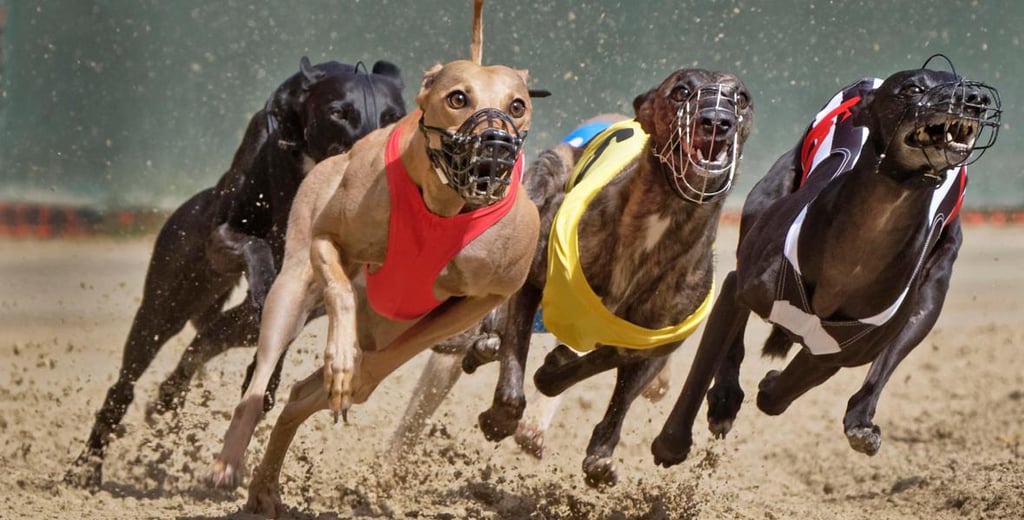The Death of the Dog Track: How Greyhounds Were Replaced by Grey Profits
For decades, the dog track was where the bookies made their money. Old-school layers stood in their little wooden booths, chalked up the odds, and took your bets with a nod and a grunt.
Ed Grimshaw
2/26/20253 min read


There was a time when a Saturday night at the dogs meant something. A man could stand at the rail, pint in one hand, betting slip in the other, and believe, if only for 28 seconds, that he had an edge over the universe. The dogs hurtled around the track, the bookies took the bets, and somewhere in the crowd, a bloke called Bazza was either punching the air or lobbing his flat cap in despair.
But then came Tesco. And after Tesco, came the bookies. And after them, the Gambling Commission. And somewhere in between, a parade of self-interested politicians took their envelopes, nodded sagely about “consumer protection,” and oversaw the gradual killing off of greyhound racing as a proper sport.
From Tesco Trolleys to Digital Addiction
Your local greyhound track – in Blackburn or anywhere else – wasn't just a place to lose a tenner on a dog called Lucky’s Disaster. It was a social institution. A place where working men, pensioners, and the occasional nervous first-timer could stand together, united in their collective delusion that tonight, just tonight, they were a shrewd judge of canine athleticism.
Then Tesco turned up, like an invading army of fluorescent lighting and bulk-buy misery, paving over the track to build yet another aisle of tasteless fruit and own-brand lager. Once upon a time, you backed Mad Mick’s Revenge in the 9:15; now you trudge past the frozen pizzas, watching pensioners scan loyalty cards like prisoners on day release.
Of course, if it had just been Tesco, it might have been forgivable. After all, at least you can eat what they sell. But no – the real wrecking ball to greyhound racing wasn’t supermarkets. It was the slow, cynical strangulation of the sport by the very industry that was meant to support it: the bookmakers.
The Corporate Bookies Killed the Bookies’ Sport
For decades, the dog track was where the bookies made their money. Old-school layers stood in their little wooden booths, chalked up the odds, and took your bets with a nod and a grunt. The smart ones had a cigar permanently glued to their lips, and the really smart ones could tell if your fiver was worth taking just by the look in your eyes.
But then came the shift. Why would a modern bookmaker want you down at the track, where you might win occasionally, when they could funnel you into their high-street betting shops, where fixed-odds betting terminals (FOBTs) could rinse your wages far more efficiently?
Gone was the fresh air and the thrill of a photo finish. In its place? A bloke in a Wetherspoons, staring dead-eyed at a virtual roulette wheel as it swallowed his last twenty quid.
The bookies stopped caring about the dogs. They shifted their focus to online gambling, where they could entice punters with algorithmically targeted offers, all while lobbing responsible gambling messages onto their websites in the same way McDonald's tells you to "consider a side salad."
The Gambling Commission: Protecting the Wrong People
And then, just when you thought the destruction was complete, the Gambling Commission turned up to save us. Oh, what a noble effort that’s been.
Their great achievement? Restricting bets for anyone remotely competent, while letting problem gamblers lose thousands without a second glance. They brought in affordability checks – meaning that if you win too often, you’ll be treated like some sort of financial criminal. Meanwhile, the bloke who’s racked up a £30,000 debt chasing his losses gets a few polite nudges about “staying in control.”
Meanwhile, greyhound stadiums close at an alarming rate, replaced by soulless housing developments or another bloody Costa Coffee. The sport is still hanging on – just about – thanks to the few remaining independent tracks and the stubborn loyalty of those who still remember what a real Saturday night bet looks like.
From Rogues to Robots
It wasn’t perfect, of course. The old dog tracks had their fair share of rogues. The trainers who fed their hounds questionable supplements. The “mystery scratches” that ruled favourites out at the last minute. The whispering punters who knew things they shouldn’t. But at least it was human. At least it had heart.
What have we got now? A world where politicians shed crocodile tears over gambling addiction while simultaneously pocketing lobbyist money from betting firms. A world where high-street bookies have morphed into glorified slot-machine hubs, and greyhound racing is little more than a sideshow to be streamed into betting apps at 2 am.
The dog track was a piece of working-class culture, and like so much else, it was deemed surplus to requirements. What we got instead was a cold, digital dystopia where the bookies don’t need punters in their shops, because they can fleece them from the comfort of their sofas.
So, yes. Tesco built on your dog track. And then the bookies built something much worse: a world where betting is no longer about instinct, luck, or knowledge – but about data-harvesting, addiction algorithms, and government rubber stamps.
And in that world, the only real winners are the ones who never play the game at all.
